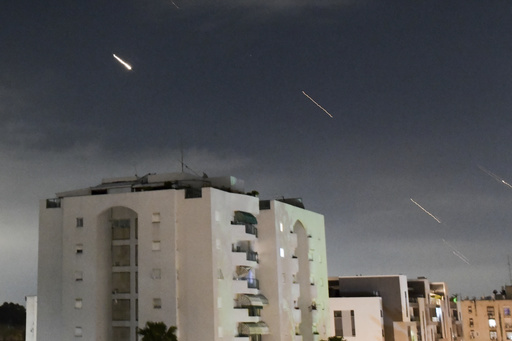DUBAI, United Arab Emirates — Amidst tensions following the assassination of a Hamas leader in Iran, the country’s missile program emerges as a key means for Tehran to retaliate against Israel. However, there are doubts about the effectiveness of Iran’s missiles. During an April assault, many Iranian projectiles did not hit their targets, with some being intercepted by a U.S.-led coalition or failing at launch. A recent report shared with The Associated Press suggests that one of Iran’s advanced missiles is less accurate than previously believed.
The prime goal of Iran’s missile program seems to have shifted from conducting conventional military operations to potentially using missiles as terror weapons due to their lack of precision. This change in the role of Iranian missiles was evident during the recent assault on Israel, where the accuracy of the missiles was called into question. Iranian missiles may now be more useful for instilling fear rather than achieving precise military objectives.
Despite Iran’s threats to retaliate for the assassination of Ismail Haniyeh, the country’s missiles have not been as successful as intended. Supreme Leader Ayatollah Ali Khamenei indirectly acknowledged the limitations of Iran’s missile capabilities, emphasizing the symbolic importance of the country’s military presence on the international stage.
The retaliatory attack launched by Iran in April involved a combination of drones and missiles targeting Israeli locations. However, many of the missiles were intercepted by missile defense systems deployed by the U.S., the UK, France, and Jordan. The attack, which included drones and ballistic missiles, aimed to overcome Israeli defenses but was largely unsuccessful, with a significant portion of the Iranian missiles failing at launch or crashing before reaching their targets.
Following the attack, analysts assessed the strike on the Nevatim Air Base near Jerusalem, where Iranian missiles failed to hit their intended targets accurately. The inaccuracies in the missile strikes raise concerns about the effectiveness of Iran’s missile program. Factors such as electronic warfare measures, potential sabotage, poor missile design, and the distances involved in the attack contributed to the poor performance of the missiles.
Looking ahead, if Iran chooses to retaliate against Israel directly, it may continue to rely on missiles and long-range drones. However, given the limitations of its air force compared to Israel’s advanced military capabilities, Iran’s missile program remains a central component of its military strategy. Additionally, concerns persist about Iran’s nuclear ambitions, with Western intelligence agencies monitoring the country’s activities in relation to nuclear weapons development.
The evolving landscape of Iran’s missile program and the challenges it faces in achieving precision strikes highlight the complexities of the region’s security dynamics. As Iran continues to enhance its missile capabilities, the international community remains vigilant about the potential implications of Iran’s military actions.
